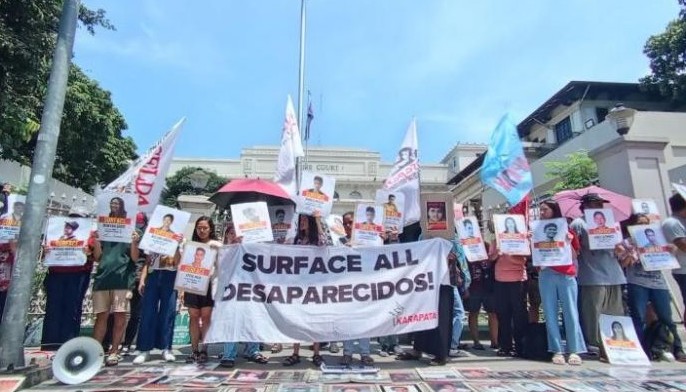MANILA, Philippines — New cases of enforced disappearances continue to mount under President Ferdinand Marcos Jr., human rights groups said on Friday, August 30, marking the commemoration of the International Day of the Victims of Enforced Disappearances.
Since Marcos assumed office in 2022, at least 14 persons have gone missing after reportedly being abducted, making enforced disappearance a "fast-growing phenomenon," human rights group Karapatan said.
Most abductions took place in "heavily militarized regions," including places covered by the controversial Memorandum Order No. 32 issued under former President Rodrigo Duterte, according to Unyon ng mga Manggagawa sa Agrikultura, a group advocating for farmers' and agricultural workers' rights.
Those who have been reported forcibly disappeared in recent months are the following:
- James Jazmines, brother of National Democratic Front of the Philippines consultant Alan Jazmines, who was last seen in Albay on August 23
- Rowena Dasig, environmental advocate, who was last seen after being released from detention outside the Lucena City District Jail on August 21
- William Lariosa, trade union organizer, who was last seen in Quezon before being arrested on April 21
Condemning the government's refusal to cooperate in resurfacing those missing, Karapatan also stressed that enforced disappearances have "long been employed by tyrannical regimes as a strategy to spread terror within a society."
"The families, support systems and communities of the victims often experience harassment and other hardships in the course of their search for their loved ones," the group said.
The Philippines was the first in Asia to outlaw enforced disappearances through the passage of Republic Act 10353 or the Involuntary Disappearance Act of 2012. Under this law, those responsible for enforced disappearances can be punished with a maximum penalty of life imprisonment.
However, for Karapatan, "state collusion" has rendered the law useless due to the "thick veil of impunity shielding the perpetrators."
The Philippines has also yet to sign and ratify the United Nations' International Convention for the Protection of All Persons from Enforced Disappearances.
Ariel Casilo, chairperson of the Unyon ng mga Manggagawa sa Agrikultura, noted that enforced disappearances were also prevalent under the president's father, ousted dictator Ferdinand Marcos Sr. Under his rule, victims of enforced disappearances were estimated to be around 926, the highest ever under any president.
Meanwhile, Rep. France Castro (ACT Teachers) said in a statement on Friday that the Movie and Television Review and Classification Board (MTCRB) will soon be made to explain why it slapped an "X" rating on a documentary about the abduction of activist Jonas Burgos in 2007.
Directed by the activist's brother, JL Burgos, "Alipato at Muog" was essentially removed from all cinemas due to the rating given by the MTRCB. The board said the documentary "undermines faith and confidence in the government and/or constituted authorities" while artists called the move a "blatant act of state censorship."
The lawmaker vowed to seek an explanation from the MTRCB when it faces the House of Representatives for the deliberations of its proposed 2025 budget. The agency is under the Office of the President, which will have its budget briefing on September 9.
"As legislators, it is our duty to safeguard the rights of creators to present their truths and to ensure that oversight does not become censorship," Castro said.


